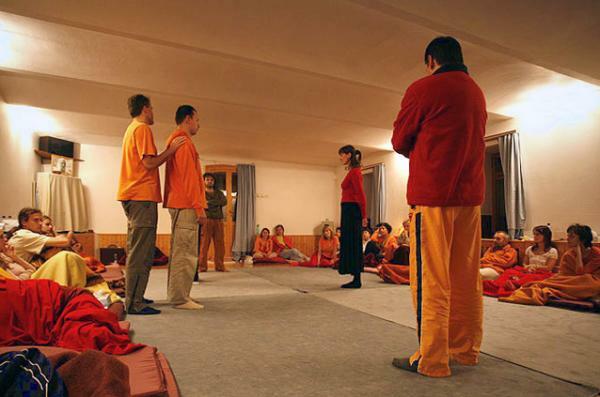
There are many tools and strategies to help people become aware of the source of their discomfort. Some more contrasted than others. Among those of the second type we find family constellations. A controversial method that causes both liking and rejection due to its lack of scientific evidence. Really, is it a useful technique? Or is it dangerous? There are opinions of all kinds.
From Psychology-Online we want to provide you with information about what are family constellations and what are they for.
Index
- What are family constellations
- How are family constellations made?
- What are family constellations for?
- Are family constellations dangerous?
- Effects of family constellations
What are family constellations.
The family constellations, according to Bourquin (2013), are based on a perception that allows us to understand those behaviors which are difficult to explain from the personal traits of the individual, but that can be explained and understood as a response to the existence of a disorder in your family nucleus.
This technique works with the last four generations of a family, that is, even the great-grandparents of the person who makes the constellation.
It was developed by the philosopher and pedagogue Bert Hellinger with the aim of reorienting and healing growing relationships within the family.
How are family constellations made.
In a constellation, one looks at whether the person is involved in the destiny of his ancestors. This aims to think, feel and even act like that family member.
They are usually done through weekend workshops and are usually done in groups, however, there is also an application for individual therapy. To start constellation, the patient must have a need that he wants to solve and that fits within the limits of the constellations.
The person, once he has exposed the problem, will choose among the rest of the participants those people who will act as members of her family. Once chosen, he will place them at the distance and in the visual direction that he considers appropriate. For this reason they are called a constellation.
According to some theorists who use this method, it is at this point where the most striking phenomenon occurs. Those people who represented the members of the family of the constellated person, they go on to feel the emotions and feelings of the people they represent, despite not knowing them.
After this, the therapist performs different movements with the intention of reestablishing order in the system, suggesting to the time different phrases that will help the subject to realize the real problem so that in this way he can generate a solution.

What are family constellations for?
The constellations aim that the person perceives the implications of her in his family so that in this way you can provide a solution to the problem that he has raised. To do this, they are helped to place themselves in the right place within the system that makes up their family.
With the help of the phrases proposed by the therapist, the person will obtain an adequate balance within the system, thus achieving harmony in your life.
Are family constellations dangerous?
To answer this question, we must start from the point that it is not a therapy with scientific evidenceIn other words, no scientific study has been carried out which can support its efficacy. Therefore, any positive result of this therapy can be attributed to suggestion and empathy.
It has been observed that its theoretical explanation is the union of different pseudosciences such as the psychoanalysis, the psychodrama, hypnosis, etc.
In addition, to perform this technique, the person who performs the constellation does not require any specialization and, for this reason, it is criticized and rejected by many professionals, since anyone can become constellator.
From the point of view of psychologists and psychologists, I have to say that none of us will use such technical because, to do so, we would find ourselves violating article 18 of our code of ethics, which says what Psychologists will not use means or procedures that are not sufficiently contrasted, within the limits of current scientific knowledge.
Effects of family constellations.
According to those theorists who are adept at constellations, the achievements and achievements are listed below. positive effects of constellations.
- Solve conflicts with the partner, parents, children and any other member of the family system that is within the four generations of antecedents.
- Understand and accept the disease in its systemic origins as a first step to recovery.
- Balance family systems.
- Coping with the fear of death and separation.
- Clarify and differentiate feelings towards other people.
- Understand that actions always have consequences.
- Regain inner balance.
- Achieve the peace and happiness that our life needs.
However, there are also a large multitude of criticism for the effects they have about the people which are constellated.
- It is a therapy that exposes the intimacy of people to others.
- It is an authoritative and inductive therapy.
- It falls into a determinism of an inescapable destiny.
- As has been well reported previously, it does not have scientific validity.
- They are based on a mystical element which has no explanation.
This article is merely informative, in Psychology-Online we do not have the power to make a diagnosis or recommend a treatment. We invite you to go to a psychologist to treat your particular case.
If you want to read more articles similar to What are family constellations and what are they for?, we recommend that you enter our category of Family problems.
Bibliography
- Alonso, Y. (2005). The family constellations of Bert Hellinguer: a psychotherapeutic procedure in search of identity. International journal of psychology and psychological therapy, 5(1), 85-96.
- Bourquin, P. (2013). Family constellations. Desclée de Brouwer.
- Gómez Gómez, F., & Pérez Doñoro, A. M. (2005). Research on the application of Bert Hellinger's Family Constellations method to clinical supervision. Journal of Research in Psychology, 8(1), 29-50.
- Pacheco, B. M. (2008). What are family constellations? UARICHA, 10, 32-38.


